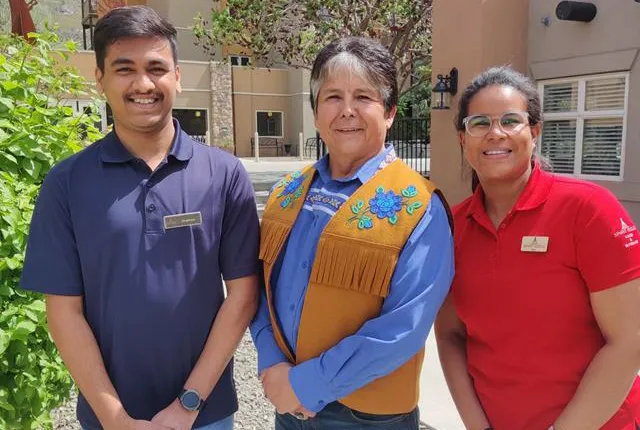
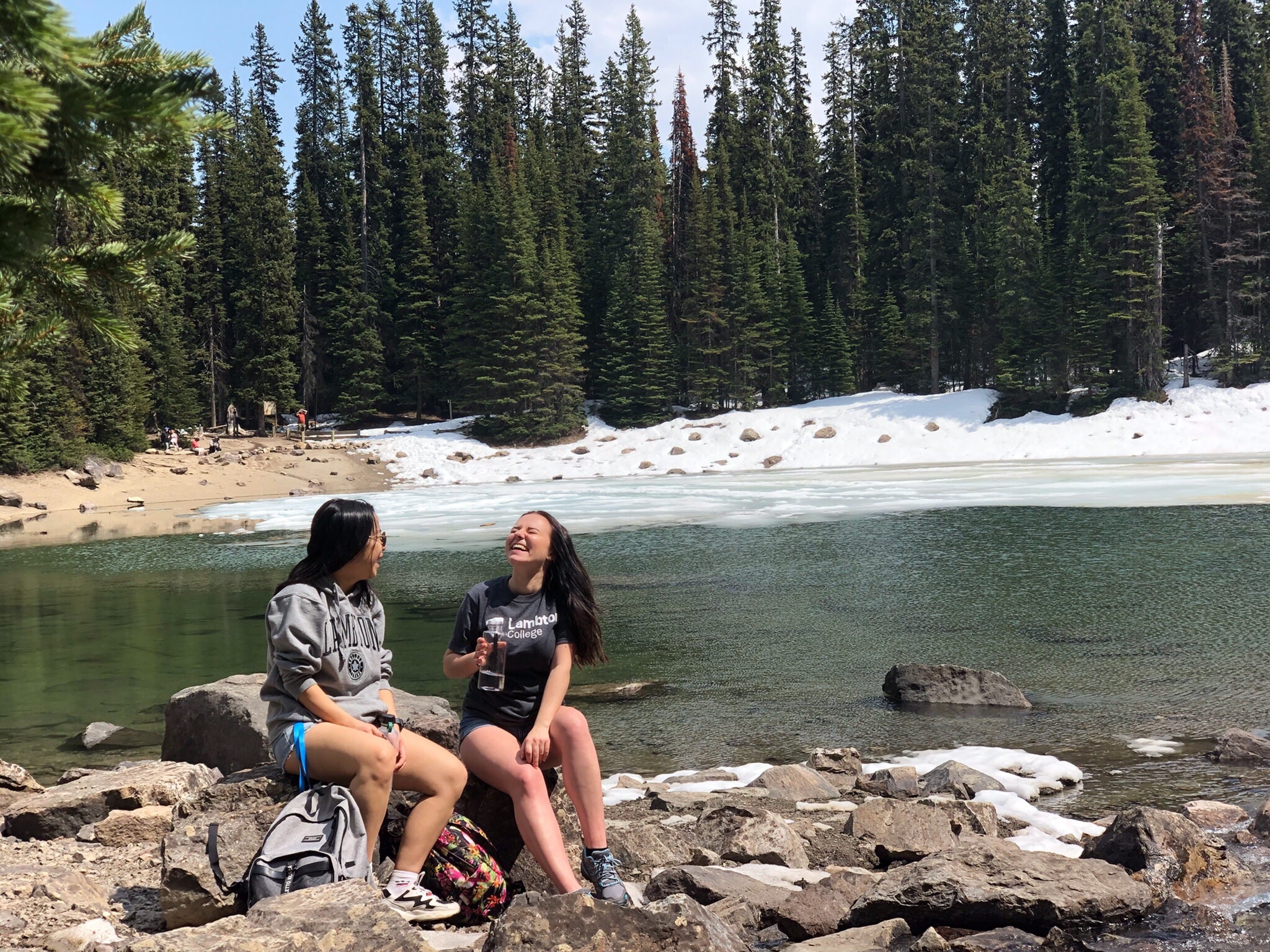
Tourism - Operations Management
Overview
Discover the skills necessary to thrive in the dynamic and growing tourism industry. Gain comprehensive understanding of tourism operations and sustainable practices, marketing strategies, and hospitality management
Engage in a program and industry where people are the heart. Leadership, cultural intelligence, and a managerial approach to business operations are areas explored. Passion for creativity, flexibility, ability to lead others in business environments ensures graduates are prepared to advance their careers in this dynamic industry.
Trained professionals enjoy career success creating experiences for corporate and entrepreneurial tourism organizations including destination marketing organizations, world class hotels and resorts, tourism attractions, entertainment venues, gaming organizations, and all businesses that value the customer experience.
Where Collaboration Fosters Success
Admission Requirements
O.S.S.D. or equivalent with:
- Grade 12 English C or U
Mature Student Assessment for this program is available in the subject of English for the purpose of demonstrating proficiency in this required admission subject. For all other admission requirements, applicants must complete the required course(s) as listed above. For more information, please contact counselling@lambtoncollege.ca. Review the Mature Student Admission process.
Academic admission requirements can be obtained through Academic Upgrading and the Pre-Programs at Lambton College.
Our Approach to Hospitality Management
Students in this program are exposed to real-world learning through a variety of ways during their time at Lambton College.
24 Months to Credential
A unique, continuous learning approach combines three academic terms with a co-operative work term.
Student Centred Curriculum
Active, engaging, and applied learning opportunities.
Transferable Skills Development
Acquire business skills that open doors to all areas of the tourism industry and beyond.
Leadership & Cultural Intelligence
Enhance abilities to build relationships and lead others.
Decision Making Foundation
Explore solutions that are socially responsible, environmentally sustainable, and ethical.
Hear why you'll LOVE this program
Costs
- Year 1 $4,634.34
- Year 2 $2,388.54
Please Note: These fees apply to the 2024-2025 academic year and are subject to change. Fees do not include books (unless specifically noted), supplies or living costs.
Additional Fees
-
Uniform$150.00
-
Simulations & Access Codes$210.00
-
Experiential Learning$200.00
-
Textbooks - Term 1$115.00
-
Textbooks - Term 4$240.00
Pricing is based on current available information and is subject to change.
Scholarships Available
There are 10 scholarships available for this program, with a total value of $3,500!
Technology Requirements
In order to keep pace with the requirements of each and every course in your program, Lambton College requires that each student have access to a laptop while studying at our college.
Courses
Tourism Foundations
Explore the range of operations, career opportunities and the interrelationship among the sectors of the Tourism Industry. This course is designed to develop a foundation of concepts and vocabulary for use in future courses and a lens that is consistent with the United Nations' Sustainable Development Goals (SDGs).
Leadership Development
Build a strategy for personal growth and development of leadership abilities through reflection of personal values, behaviours, and contributions to teams. Equity, diversity, and inclusion (EDI) discussions provide the framework for building successful hospitality workplace cultures, setting self-leadership goals, and contributing to successful teams.
Tourism Technology
Learn and apply computer skills needed by the tourism professional including information management and collaboration. Microsoft application skill development includes Excel, Word, Powerpoint, OneDrive, and Teams.
Food and Beverage Operations
Develop the skills, knowledge and abilities required for professional food and beverage service. Restaurant operations, service standards, dietary requirements, mixology, and cost control are explored in theoretical discussions and practical application.
Tourism Careers
Develop your personal brand and earn industry certifications as first steps on your path to career success in the tourism and hospitality industry. Explore opportunities, craft stand-out resumes, prepare for interviews, and earn nationally recognized certifications in food safety, responsible beverage service, and occupational health and safety. Seamlessly transition from classroom to co-op with the guidance and practical skill development to launch your career with confidence.
Workplace Communications
This course focuses on skills required in any organization or position: writing business documents, responding to realistic scenarios, and speaking in an organized and vibrant manner. Students will practice professional and inclusive communications skills by producing, revising, and editing short business documents and engaging in verbal interactions and presentations.
Financial Control
Manage and operate successful hospitality and tourism enterprises by gaining a solid understanding of financial management. Preparation and interpretation of financial statements and key performance indicators are some of the skills developed to maximize profitability of operations.
Tourism Marketing
Explore the unique philosophies associated with the marketing of tourism products and experiences. Discussions include the extended marketing mix for services, target market research, e-marketing, and the application of relationship management strategies.
Hotel Operations
Approach corporate and entrepreneurial lodging operations from a departmental perspective. Discussions will encompass standard operating procedures, best practices, trends and legal considerations that ensure overall guest satisfaction and revenue maximization. A cloud-based property management system is used as a means of exploring hotel organization, front office procedures, rate structures, reporting, communication and the use of technology in lodging properties.
Human Resources
Gain the skills necessary to execute each stage of the employment process with a focus on attracting, developing, and retaining customer-focused tourism professionals. An exploration of Canadian employment law and the United Nations' Sustainable Development Goals (SDGs) will serve as a pathway to equity, diversity, and inclusion in the workplace.
Tourism Trends
Go beyond traditional tourism to explore sustainable and responsible tourism products and their target audiences. An exploration of community and environmental impacts of various tourism types leads to discussions on how tourism operations can align with the United Nations' Sustainable Development Goals (SDGs).
General Education Elective (Select 2)
Co-Op Work Term
WIL Project
Work Integrated Learning (WIL) Project is aimed at enriching students by connecting different program areas of study, cutting across subject-matter lines, and emphasizing unifying concepts. The focus of the WIL Project is to make connections between study and industry by engaging students in relevant and meaningful activities that are connected to and practiced within the professional workplace. WIL Project allows students to enhance and strengthen their employability prospects post-graduation by fine tuning skills and knowledge and meeting the expectations of today's employers. Students are required to attend the scheduled shifts in the WIL office, reporting to the WIL Supervisor. Weekly real-world challenges are presented in the WIL office, designed by industry professionals. In addition to the weekly assigned deliverables, students are also offered professional development sessions, and exposed to industry guest speakers, enhancing their opportunity to develop their professional network.
Events, Meetings and Conferences
Study the diverse components and concepts of planning and coordinating Meetings, Expositions, Events, and Conventions (MEEC). Strategic planning, project, risk and financial management, marketing, and site management are examined. Learners will have opportunities to develop skills, knowledge and abilities required of an event planner.
Marketing Essentials
Explore the exciting world of hospitality and tourism marketing. Create captivating marketing campaigns that resonate with the unique demands of the industry. Develop the essential skills for leveraging social media platforms, construct impactful email campaigns, and design effective poster and print materials. Learn to measure the success of your campaigns, analyze data, and refine your strategies to achieve tangible results. Equip yourself with the knowledge to lead and innovate in this dynamic industry.
Cost Management
Consider the complexities of controlling resources within the hospitality operation to maximize profit levels. Apply the necessary principles related to the control process and operating control cycle including the application of costing tools. Learners will have the opportunity to earn professional certification from the AHLEI.
Operations Management
Apply a managerial approach to problem solving in a variety of tourism operations through a modular approach to restaurant, hotel/resort, and gaming operations. Decision making considerations include balancing profits with environmental and socio-economic sustainability, and EDI (economic, diversity, and inclusion) priorities.
Organizational Leadership
Today's competitive business world demands strong organizational leadership and effective supervisory skills. This course focuses on skills required to create a productive work climate through employee engagement, training, and development strategies.
Entrepreneurship in Tourism
Develop an entrepreneurial spirit and problem-solving abilities by running your own simulated small business. Students are challenged to use prior learning in finance, marketing, human resources, and management to gain practical insights on the process of planning, opening and operating a sustainable, service focused enterprise.
General Education Elective
Co-op Eligibility & WIL Project Fee
In order to be eligible to secure an approved full-time co-op work term (CPL-1049), students must have a GPA of 2.0 or greater and complete all the co-op eligibility requirements. Failing to do so will require students to enroll in CPL-5559 WIL Project at an additional cost.
Contact
Program Information
School of Business and Sustainability Leadership
Room B2-106
After Graduation
Employment Opportunities

Tourism and hospitality industry professionals are in global demand. Some of the employers of our graduates include: Tourism Sarnia-Lambton, Fairmont Hotels & Resorts, Intercontinental Hotels & Resorts, Hyatt Hotels Corporation, Marriott Hotels & Resorts, Gateway Entertainment, and Spirit Ridge at Nkmip Resort. Graduates also find employment at Inns, Adventure Tourism, Food & Beverage companies, retail and entrepreneurial ventures.
Accreditations & Certifications
Nationally Recognized Certifications
Students in the Hospitality program will be given the opportunity to achieve these nationally recognized certifications:
- SmartServe Ontario
- TrainCan Food Safety Service
- American Hotel & Lodging Educational Institute (AHLEI) - Planning and Control for Food and Beverage Operations
- Workplace Hazardous Materials Information System (WHMIS 2015)
- Accessibility for Ontarians with Disabilities Act (AODA) Customer Service Standard Training
Pathways
Transfer to Programs outside of Ontario
- Bachelor of Business in Tourism with Event Management - enter third year of three-year program
- Bachelor of Business (Honours) in Tourism with Event Management - enter third year of four-year program
Co-op
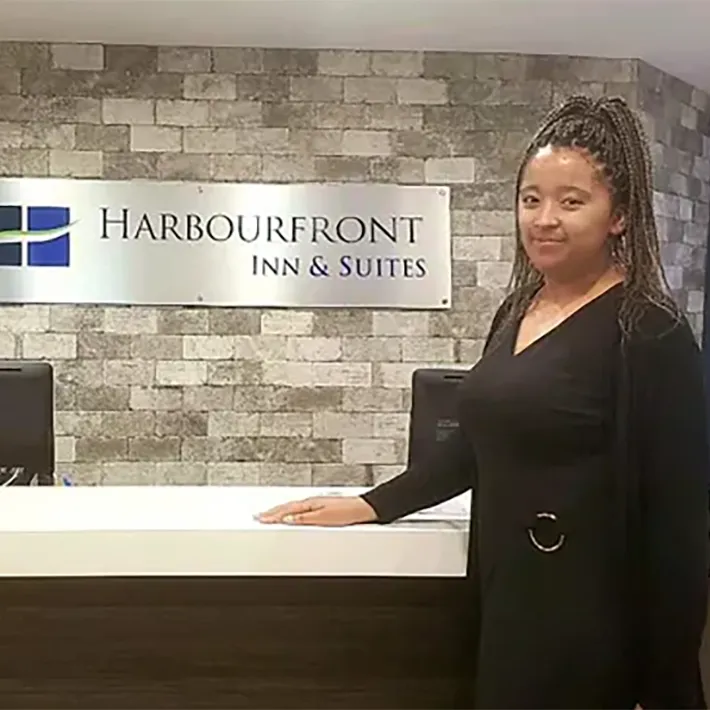
Details
The key to successful skill development is the opportunity for real world application of learning. Students are encouraged to work part-time in industry during academic terms and full-time during the co-op term. The co-op work term makes our students more attractive to employers after graduation.
Placement Types
Student positions during co-op could include:
- Hotel placements with Guest Services, Housekeeping, Tour Desk Operator, Night Auditor
- Food & Beverage opportunities at corporate, franchise, and entrepreneurial outlets
- Attractions including casinos, boat tours, wineries, and more.
Students on Co-op Placements
More Information
Student Responsibilities
- Course and program delivery schedules are proposed and subject to change for each intake.
- Students are required to bring their own laptop with wireless capability.

Technology Requirements
It is recommended that students purchase a laptop with a Windows operating system.
Internet Speed Requirements
For best performance for students learning remotely, an internet connection with a minimum of 40 Mbps download and 10 Mbps upload speed is recommended in order to effectively use video conferencing and remote lecture delivery software as well as, other online resources remotely. Due to the large area over which students may be dispersed, we are unable to recommend a specific provider, so you will need to inquire around your area to find one that best suits your needs.
Minimum Laptop Requirements
In order to access the internet and virtually-delivered software and courseware, student laptops should include the following at a minimum. By meeting the following specifications, students will be equipped to access software and courseware on their laptop through the internet:
- Intel i5 8th Gen Processor or equivalent
- 16 GB of RAM (with a minimum of 8 GB)
- 100 GB HDD or more
- HD Graphics
- Webcam with a microphone
- Wireless 802.11n/ac 5ghz capable
- Windows Operating System (Windows 11)
Please note that Chromebooks and MacBooks may not support all software required for your program; students should verify compatibility with their professors.
Software
To ensure students are getting the most our of their classroom experience, some software will be required.
Lambton College has made this software easily accessible online. Students can leverage our Microsoft Office 365 software packages and services. In addition, much of the software you require for your courses will be available on demand for use on any device - on or off campus.


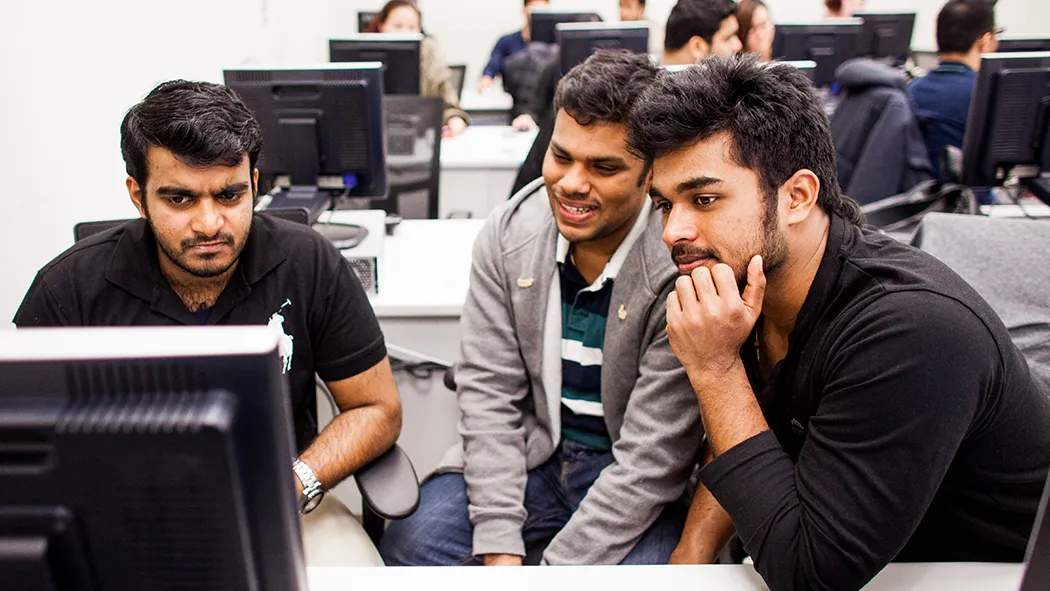

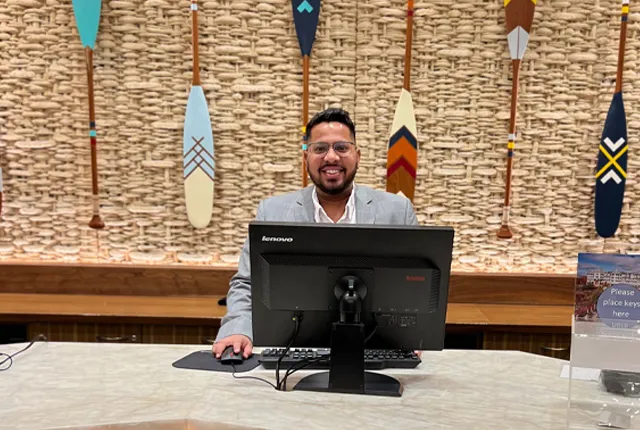
-copy.webp?sfvrsn=a6c8f8a3_1)
